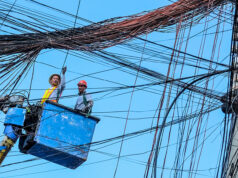Duterte flags ‘Build Build Build’ setback due to insufficient workforce
By Charmaine A. Tadalan, Reporter
THE GOVERNMENT’s flagship “Build Build Build” infrastructure development program — meant to spur overall economic growth to a sustained faster pace — has suffered delays due to a lack of workers, President Rodrigo R. Duterte himself admitted on Thursday night.
“Eh ‘yang ‘Build, Build, Build’, medyo atrasado nang konti. Walang trabahante (Build Build Build is a bit delayed do to a lack of workers),” the President said in a speech during the kick-off rally of the ruling Partido Demokratiko Pilipino-Lakas ng Bayan party in San Jose del Monte City in Bulacan.
“Alam mo, dito sa Pilipinas ngayon, maraming trabaho… Ang construction humihinto kasi walang trabahante... (There’s a lot to do here in the Philippines, but construction halts due to a lack of workers like) master electrician, master carpenter, master plumber,” he added.
“Ang karamihan ng may alam niyan wala na dito sa Pilipinas at andun na sa Middle East (Many skilled workers are no longer here in the Philippines but have gone to the Middle East)…”
The current administration has planned to spend up to P8 trillion on priority infrastructure projects up to 2022, when Mr. Duterte ends his six-year term, in a bid to drive gross domestic product expansion to 7-8% annually till then from a 6.3% average in 2010-2016 under former president Benigno S. C. Aquino III. GDP growth, however, slowed to 6.2% last year from 6.7% in 2017, weighed down in part by a struggling agriculture sector that has historically contributed about a tenth to national production.
BAD TREATMENT
The Trade Union Congress of the Philippines (TUCP), the country’s biggest labor group, confirmed Mr. Duterte’s observation of an insufficient workforce for his administration’s infrastructure drive.
“It’s true that we have shortage of construction workers,” TUCP said in a press release on Friday, quoting its president, Party List Rep. Raymond Democrito C. Mendoza.
“We are currently experiencing ‘skill and brain drain’ phenomenon because of… bad treatment of our construction workers,” he explained, citing low pay; meager benefits; poor access to certification; and unsafe, unhealthy working conditions.
“The nation is losing fast its vast and excellent reserves of construction manpower to higher pay and attractive benefits offered by companies abroad.”
Citing “different government statistics”, TUCP said in its statement that only about a million of some 3 million construction workers nationwide are certified.
“… [W]e have plenty of certified, skilled and world-class construction workers, but due to meager salary, poor benefits, unsafe and unhealthy working conditions and [since they are] lowly regarded… they prefer to work abroad after a few months of training and actual field experience here because they are dignified there, they are given higher salary and benefits there, and are given free decent housing and paid vacation,” Mr. Mendoza said.
“We have a vast pool of highly, multi-skilled and fine craftsmen, but also because of lack of training facilities and poor access to certification programs we do not tap them to become potentials for the country’s ‘Build Build Build’ programs,” he added, noting that “[m]any of them even have to pay, fall in long lines and travel far just to access national certification.”
“Construction workers even purchase their own personal protective equipment used in working, buy their own drinking water, pay for their food intake during work break to replenish strength, and [are] given a dirty and bad sleeping quarters during the whole duration of the construction project.”
GOVERNMENT STEPS
Presidential Spokesperson Salvador S. Panelo, for his part, said on Friday that Mr. Duterte has directed the Technical Education and Skills Development Authority (TESDA) to train more workers in carpentry, welding and other skills needed for the infrastructure drive.
“Sabi ni Presidente sa TESDA: ‘aba, kailangan gawan mo ng paraan ‘yan para magkaroon tayo ng malalim na bench ng mga karpentero, welders, mga electrician dahil marami ang nagpuntahan sa ibang bansa (The President told TESDA to do something about the situation so that we will have a deep bench of carpenters, welders and electricians, because many have left for jobs abroad),” Mr. Panelo told reporters in a briefing in Malacañan Palace.
“In other words, we’re doing something about it.”
For the National Economic and Development Authority (NEDA), any delay in infrastructure development was due more to the deadlock over the P3.757-trillion national budget for 2019.
“Well, not fatal yet, but it has certainly been set back… by three months siguro because the 2019 budget will be officially approved only by the end of this quarter, or by end of March,” Socioeconomic Planning Secretary Ernesto M. Pernia told BusinessWorld over telephone interview on Friday.
The government has so far been operating under a reenacted 2018 budget since Congress ratified the 2019 national budget only last Feb. 8 after months of bicameral bickering over alleged irregular fund insertions.
Asked about the President’s concern, Mr. Pernia replied: “No, lack of workers, that’s being addressed, especially with the Hanjin closure and we have several OFWs (overseas Filipino workers) are coming home to take advantage of opportunities here. That’s not a problem.”
He was referring to over 3,000 workers of Hanjin Heavy Industries and Construction Philippines, Inc., which is now under receivership after defaulting on liabilities that include some $412 million owed to six Philippine banks.
Budget Secretary Benjamin E. Diokno declined to comment on the issue, saying Public Works Secretary Mark A. Villar, Transportation Secretary Arthur P. Tugade and Bases Conversion and Development Authority President Vivencio B. Dizon “will have to validate the President’s claim”
“What, for instance, is the seriousness of the problem, if there is one? In what areas? What is the DoLE (Department of Labor and Employment) and TESDA doing about it?”



